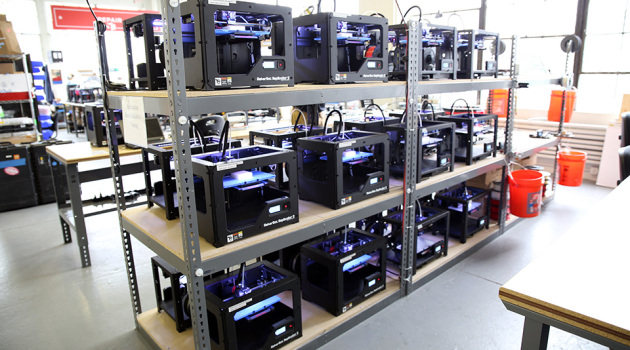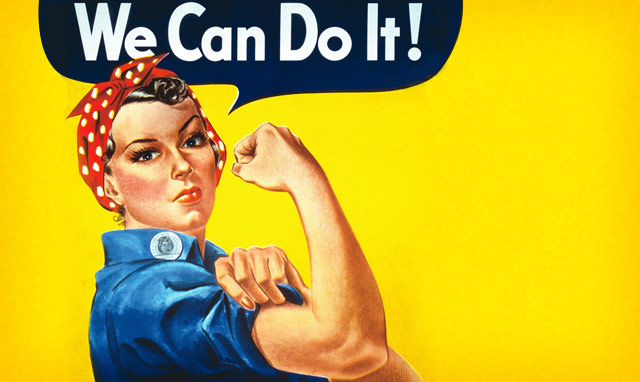The five-day work week. Chevrolet. Grand Funk Railroad. Steel plants on the shores of Lake Michigan. This is America.
There is a rebirth happening right now. It’s happening all over the country. Pockets of makers here, a consumer electronics company there. A startup accelerator in beautiful Harbor Springs, Mich. They’re appearing all over this land. And it’s all heavily advertised.
“Made in America” is, sadly, in vogue right now. “Imported from Detroit”, “This American buys American.” All bumper sticker catch phrases fueling America’s greatest innovation: capitalism.
And why not? Manufacturing is the brawn that built this land but capitalism is the beating heart.
Capitalism drives this country. And it drove companies out, too. Labor is cheaper elsewhere. Tim Cook’s supply chain management became the norm. Profit and loss statements trended towards “build it somewhere else.”
“Made in China”. It’s stamped on the bottom of my coffee mug. On the back of my phone. It’s everywhere because we put it there.
![]() There was a time not all that long ago that America was the center of manufacturing and innovation. General Motors. Bell Labs. Motorola. Fairchild Semiconductor. Silicon Valley. The lone entrepreneur making it big.
There was a time not all that long ago that America was the center of manufacturing and innovation. General Motors. Bell Labs. Motorola. Fairchild Semiconductor. Silicon Valley. The lone entrepreneur making it big.
America has always been a land of chance. Risk it all and move out west. Find gold. Build with silicon. It’s this sense of entrepreneurship that makes the country great. Most startups fail. A dramatic amount fail. But it’s that sense of possibility that initially made America great and is fueling its current growth.
All across this land, young technology companies are popping up, addressing the needs of a select few or the masses. App makers building with bits. Makers building with things. Coders hacking together and occasionally stumbling upon something great.
There’s innovative companies like Tesla, MakerBot, and Betaworks. There are visionaries like Limor Fried, Troy Carter, and David Karp. Deborah Benton, Marissa Mayer, and Gentry Underwood. They’re all united in building, growing, and making “things” in America.
There’s the lesser known: FarmLogs, a data-driven farming startup from the middle of Michigan. LitMotors, attempting to reinvent transportation. And Durham, NC’s Bound Custom Journals, makers of customizable paper journals.
These companies, along with countless others, do not have to stamp a “Made in America” sticker to the front of their products to sell it. They’re making a world-class product, in America, that will sell on its own accord. They’re doing it right.

I write this while sitting in a diner in Flint, Mich. It’s a safe harbor in the midst of massive abandonment. Capitalism built my city and ultimately destroyed it. And it’s the fine people here and in other cities like it who are wronged by companies playing to their broken emotions.
American consumers want to buy and use products made by Americans. Lay-Z-Boy recliners. Whirlpool washers. Chevy trucks. Many will pay a premium with the hope a bit of their cash will help other Americans.
Sadly, the spirit of capitalism preys on the ignorant. The Chrysler 200 might be imported from Detroit as the infamous Chrysler Super Bowl commercial proclaimed. But it’s a pathetic example of an automobile compared to other U.S.-made cars. Eminem might sell his song for a paycheck, but he wouldn’t buy that car.
There’s an ugly side of “Made in America”. The part where the American origin of a product is more loudly advertised than the products themselves. The products advertised with a waving American flag, white picket fence and an old Ford truck.
It’s sickening. Disgusting. The “Made in America” label should be used with pride, not greed. It’s too often a cheap ploy. A tactic designed to incite emotion over practicality. And it’s this trick that companies need to use sparingly. Companies need to walk a delicate line, carefully crafting an American message without overplaying a point that can be construed as trivial.
Shinola is a Detroit-based watch maker. I spoke with the company’s CEO, Heath Carr of Texas’ Bedrock Manufacturing, at some length about Detroit, making watches, and selling on a schtick.
“Ultimately it came down to ‘Why not Detroit?’,” Carr told me. “Everyone we met [in Detroit] wanted to help. There wasn’t a city that had a trained workforce. We didn’t expect there to be one.”
Shinola now employs 45 people in Detroit making watches, bikes, and paper journals. And Detroit needs every job it can get. Born out of Bedrock Brands, a privately held Texas-based firm owned by the founder of Fossil Inc. Tom Kartsotis, Shinola now occupies a 30,000 square foot space in Detroit’s historic Argonaut building.
Carr explained that Shinola wants to be transparent. Its website lists the sources of all the materials used.
In this case, the transparency is obnoxious. The “Made in Detroit” mantra is exclaimed loudly throughout Shinola’s website. Carr believes that the product can stand on its own. Most watch geeks disagree, pointing to inexpensive Swiss movement and mass manufacturing.
But the watch isn’t the problem. It’s the messaging. Tone down the rhetoric. “Where American is made.™” Just make the damn product. Who cares where it’s made?

Makerbot invigorated the maker movement and never left Brooklyn. Yet these amazing products are advertised on their own merits, not place of origin. The only place you see Brooklyn is hidden under the machine – where “Made In China” used to hide.
MakerBot’s Bre Pettis explained to me that American manufacturing is extremely important to him. A fact proven by the pains the company had to endure keeping the manufacturing process in the New York City area.
“By manufacturing MakerBots with Brooklyn pride, we can iterate faster and innovate more,” Pettis said. “Our mechanical engineers work closely with our manufacturing engineers to build solutions quickly. It really helps to have everyone in the same borough when you’re making a precision engineering tool like the MakerBot Replicator 2 Desktop 3D Printer.”
There are inherent advantages of having products built here. Practical advantages. Financial advantages. And yes, advertising advantages.
Tesla, for their part, is trying to sell cars in America. On their own. But in every city they try, the entrenched car dealerships are trying to stop them. Mom and Pop car lots, fat on the benefits of zero competition, are standing in the way of the upstart manufacturer wanting to sell cars on their own. “That’s not how it’s done.” That’s not how it’s done in America, friends. If we’re going to put down the flag and do business, it should be on an even playing field. Tesla isn’t going to sink Grandma’s Chevy out on Route 60. Grandma is going to sink her own dealership if she doesn’t grow up.
I live just outside of a dead factory town. It’s with that thought that I find it so refreshing to see small-scale manufacturing return. Parts are made elsewhere, sure, but it’s important to many that the gadget is, at least in part, from here.
Take the Nexus Q. It was to be made in America at a low volume facility just up the road from Google. That was bigger news than the device’s feature set.
Many Americans desperately want to buy products from here. Assembled, manufactured, made — the actual amount of work doesn’t matter. Just as long as American hands had a part in the process before the product was encased for retail. They want to feel like part of the solution. They want to help fix the country. And a few companies have hijacked that sense of pride to hawk their wares.
But that’s freedom. That’s America.
